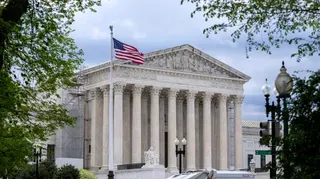April 29, 2010
Following U.S., China Ends HIV+ Travel Ban
Kilian Melloy READ TIME: 2 MIN.
Two years after then-President George Bush signed legislation to end America's ban on HIV+ travelers entering the country, China has announced the end of a similar ban that affected not only people living with HIV, but those who had other STIs, as well as those with leprosy.
The end of the travel ban was announced April 26 at a Chinese government web site, just prior to the May 1 opening of the world exposition in Shanghai, reported the New York Times in an April 28 article. The change--which amends two laws, one from 1986 and another from 1989--became effective on April 24.
Though temporary reversals of the HIV+ travel ban have been adopted by the Chinese government in the past, the article said that the new amendment seems to be intended as a permanent change. Some health-related travel bans remain in place, the article said, including exclusions targeting serious forms of mental illness and "infectious diseases which could possibly greatly harm the public health," such as tuberculosis.
China enjoys a relatively low rate of HIV infection, with estimates ranging from about half a million to one million Chinese living with the virus.
The American ban had been in place since the 1980s, when the means of transmission of the virus was poorly understood; in 1993, however, long after it was known that HIV cannot be casually transmitted, Congress acted to reaffirm the ban. In 2008, President George W. Bush signed legislation to rescind the ban, but nonetheless, still-extant U.S. Department of Health & Human Services regulations prevented HIV-positive travelers from entering the country without first obtaining difficult-to-secure visas. As a result, sixty Canadian would-be participants in the North American Housing and HIV/AIDS Research Summit in Washington, D.C. last June were denied permission to enter the United States.
President Obama approved the removal of those last barriers in January of this year, calling the action "a step that will encourage people to get tested and get treatment, it's a step that will keep families together, and it's a step that will save lives." Added Obama, "If we want to be the global leader in combating HIV/AIDS, we need to act like it."
A press release from the office of Massachusetts Democratic Sen. John Kerry noted that Kerry, who serves as the Chairman of the Foreign Relations Committee, had been a leader in efforts to end the U.S. travel ban, co-authoring the law that then-President Bush signed two years ago.
"This is a evidence that when the United States leads with our ideals, the world takes the power of our example very seriously," Kerry said. "We fought hard to end our own unwarranted, unjustifiable HIV travel restriction, and now China has taken the same step." Added Kerry, "I urge other nations to follow this example by striking down any law that unjustly discriminates against HIV positive individuals."
More than 50 nations worldwide still have such bans in place, including Cuba, Egypt, North Korea, Israel, New Zealand, Poland, Singapore, Iraq, and Russia. But South Korea repealed its ban on HIV+ travelers at about the same time America did.
Kilian Melloy serves as EDGE Media Network's Associate Arts Editor and Staff Contributor. His professional memberships include the National Lesbian & Gay Journalists Association, the Boston Online Film Critics Association, The Gay and Lesbian Entertainment Critics Association, and the Boston Theater Critics Association's Elliot Norton Awards Committee.







